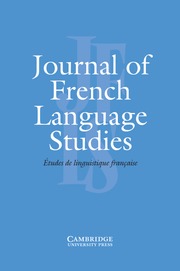Article contents
Factors driving lexical variation in L2 French: A variationist study of automobile, auto, voiture, char and machine1
Published online by Cambridge University Press: 01 November 2008
Abstract
Our paper examines lexical variation in the spoken French of second language learners and focuses on words referring to the notion of ‘automobile’ (i.e., automobile, auto, voiture, char and machine). Results reveal that while students do follow the native speaker pattern of using the neutral variant auto in most instances, they diverge from native speakers by making no use of the vernacular form char and relatively high use of the prestige variant voiture. The principal external factors that influence variant choice are students' home language and the representation of variants in the input to which students are exposed.
- Type
- Articles
- Information
- Journal of French Language Studies , Volume 18 , Special Issue 3: Knowledge and use of the lexicon in French as a second language , November 2008 , pp. 365 - 381
- Copyright
- Copyright © Cambridge University Press 2008
Footnotes
The research reported upon in the present article was made possible in part through a research grant awarded to Raymond Mougeon and Terry Nadasdi by the Social Sciences and Humanities Research Council of Canada from 1996 to 2002.
References
REFERENCES
- 7
- Cited by


